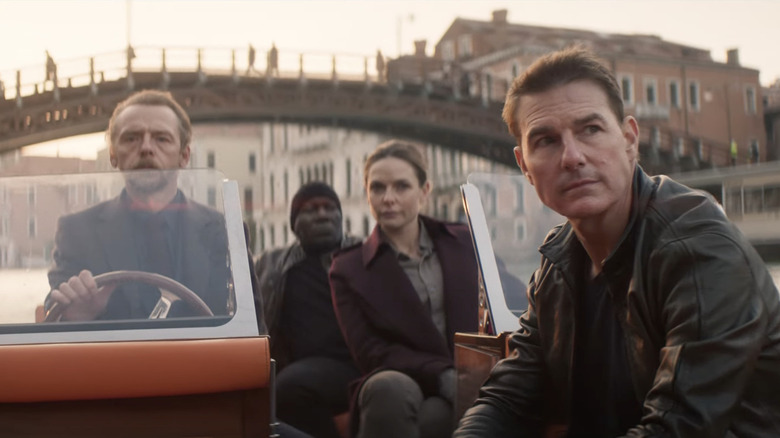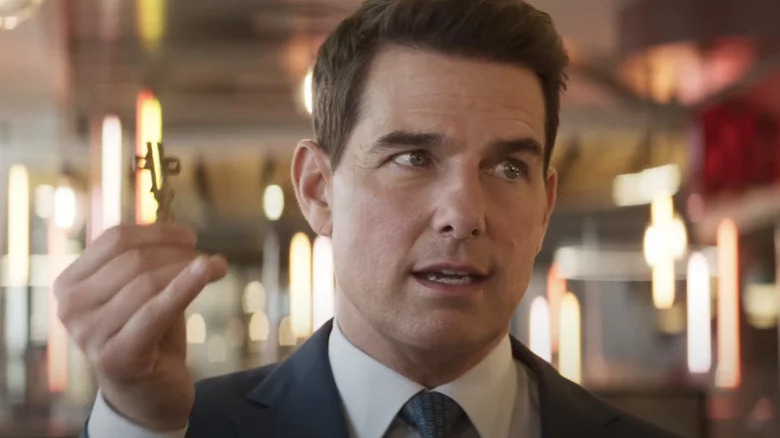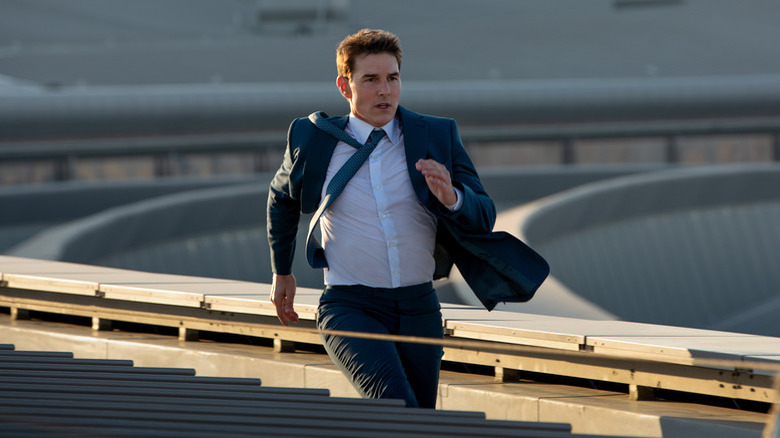Mission: Impossible - Dead Reckoning Finally (Kinda) Explains How People Become IMF Agents
The "Mission: Impossible" movies are a rare kind of blockbuster. At a time when shared universes, connectivity, and lore are all the rage, these movies tend to play more old-school, focusing on standalone adventures with satisfying conclusions. It makes sense, since the films are both adapted from, and technically a sequel to the 1960s TV show of the same name. The franchise has a sense of experimentation seldom seen in blockbusters, with each film trying something completely new and different from the rest, and each new director adding their unique vision and style into their movie.
This changed once Christopher McQuarrie took the reins of the franchise. Because he's helmed multiple movies, he's introduced more continuity into the series, with plots and arcs carrying over from one movie to the other in recent years and a bigger focus on leftover plot threads coming back like it was "Fast and Furious." This is particularly true of "Mission: Impossible: Dead Reckoning – Part One," which brings back old adversaries and a rather timely threat, all while deepening the lore around Ethan Hunt and the IMF thanks to some retconning, and some flashbacks.
Indeed, one of the big surprises in "Dead Reckoning – Part One" regarding its lore is the inner workings of the IMF, namely how exactly one joins the team, and what the larger intelligence community thinks of them.
Heavy spoilers for "Mission: Impossible: Dead Reckoning – Part One" to follow.
Should you choose to accept it
In the film, we get a new member of the team in Hayley Atwells' Grace, a thief who gets involved in the hunt for the two-part MacGuffin that could destroy or control a powerful A.I. known as The Entity. Knowing she will be hunted for the rest of her life regardless of what she does, Ethan proposes an alternative: take "the choice."
The "choice," of course, refers to the iconic opening of every "Mission: Impossible" movie and every episode of the TV show, wherein the team leader receives a tape describing the next mission, starting with the line "Your mission, should you choose to accept it ..." In "Dead Reckoning – Part One," however, the words take a different and broader meaning. We learn that every member of the current team, Ethan, Luther, and even Benji, were all leading shady lives at one point, but at some pivotal moment, they were given "the choice" to dedicate their lives to the IMF and do some actual good for the world. Grace is given that choice, and she chooses to accept it, eventually asking Kittridge to join the team.
This is rather significant, as it makes this particular iteration of the team look more like the Suicide Squad — a collection of criminals and people with nowhere else to go given one suicidal chance at redemption — rather than Bond characters. If that scene wasn't enough to change your mind on the IMF, there's another one that just might, because "Dead Reckoning – Part One" pulls a "Fast X" and gives us the second scene in a year where a group of people questions the sanity of our protagonists in a way that actually makes a lot of sense.
Give word
Early in the film, we are reunited with Eugene Kittridge, the former head of the IMF, who is in a meeting with "The Community," the leaders of every intelligence service in the U.S., as they discuss the threat of The Entity, the powerful A.I. that went rogue and is eating up every dirty government secret online like its Diaboromon in "Digimon: The Movie."
When Denlinger, one of the head honchos of The Community, asks about Kittridge's agent who is in pursuit of the MacGuffin, Kittridge tries to explain who Ethan is without naming him, mostly calling him chaos incarnate. Kittridge tries awkwardly to explain what the IMF is, saying it is the secret agency you call when things seem impossible, and that they don't exactly assign missions per se, but simply "give word" and assume someone on the other side picks up the assignment.
This places the entire franchise in a new light, making the government agents that deal with the IMF appear rather blind in their trust in Ethan and the others. It brings to mind the scene in "Fast X" where someone finally calls Dom's family a cult, in that it is hilarious, but also maybe a good point.
We are seven movies into the "Mission: Impossible" franchise — which could go on forever, but this is perhaps the first time we really see an interrogation of the very idea of an Impossible Mission Force, and that rules.


